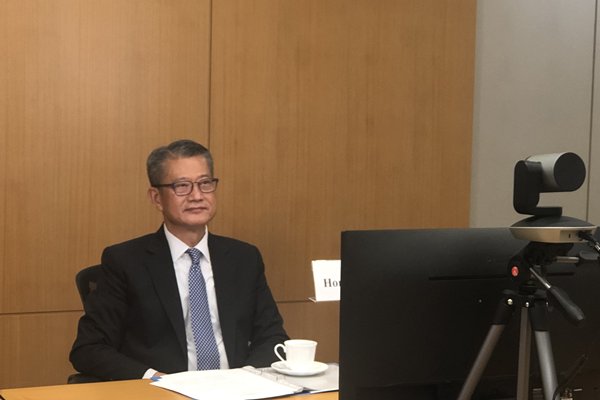FS attends APEC meeting

Financial Secretary Paul Chan attends the Asia-Pacific Economic Cooperation Finance Ministers’ Meeting 2020 convened virtually due to the global spread of COVID-19.
Financial Secretary Paul Chan today attended the Asia-Pacific Economic Cooperation (APEC) Finance Ministers' Meeting (FMM) 2020.
The event was, for the first time, convened virtually due to the global spread of COVID-19.
Mr Chan addressed the meeting on the challenges and opportunities presented by COVID-19 for the global economy. He also described to the meeting Hong Kong's policy response to the unprecedented crisis and shared his views on prescriptions for economic recovery in the region.
He said this year will go down in history as one of the global economy's most daunting times, a sorely testing period for all.
Noting that the pandemic is expected to inflict a 5.2% contraction in global GDP this year, according to the World Bank, Mr Chan said it will mark the deepest recession suffered by advanced economies since World War II, and the first output contraction in emerging and developing economies in more than six decades.
“Confronted by such a colossal global health and economic emergency, our priority must be to save lives and limit economic hardship.”
Mr Chan said Hong Kong has adopted a “suppress and lift” strategy to achieve it.
“Through the considered deployment of anti-epidemic and social distancing measures, we have succeeded in minimising infections, allowing many economic activities to continue without resorting to a total lockdown.
“We have also rolled out several relief packages of unprecedented scale to support businesses, particularly small and medium-sized companies, and to protect employment. The strategy has largely worked to contain socio-economic fallout."
Remarking on the strategy for economies to get out of the doldrums, Mr Chan underlined the importance of international co-operation and free trade and investment in the critical path to global economic recovery.
He called on all APEC member economies to act in unity and focus efforts on reigniting trade and investment as engines for growth.
"As the crisis has taught us, all too well, fighting a pandemic requires collective will and a global solution.
“For economies to survive, and thrive, after the pandemic, we must stand together in the search for growth prospects as well as vaccines. We need open borders not walls, co-operation not confrontation, if we mean to revive our economy in the post-COVID-19 world.”
Mr Chan said economies must refrain from erecting trade or investment barriers, rejecting, as well, policies that are irrational and divide the world, that disrupt the global economy.
“Through such steely purpose and determination we will, ultimately, heal the enduring scars of this global crisis," he added.
Noting that the pandemic has accelerated the digitalisation of economies, Mr Chan further highlighted the need for APEC members to invest in digital transformation and human capital to ensure sustained recovery.
“We must harness the prospects presented by e-commerce and other elements of the digital economy if we hope to accelerate economic recovery.
“We must also expand our investment in human capital. Our workforce, our people, must be equipped with the agility and resilience of the digital age if they are to withstand future shocks, if they are to live up to the promise that innovation and technology can realise.”
The meeting was hosted by Malaysia and chaired by Minister of Finance of Malaysia Tengku Zafrul Tengku Abdul Aziz.
Participating ministers exchanged views on fiscal and monetary responses to mitigate the impact of COVID-19, and the role of digitalisation in keeping businesses afloat during the pandemic.
The meeting concluded with the issuance of an FMM Statement, in which finance ministers reaffirmed their commitment to continue policy efforts in fostering economic recovery, leveraging the proliferation of digital technologies to drive financial inclusion, and striving for shared prosperity through co-ordinated multilateral responses.